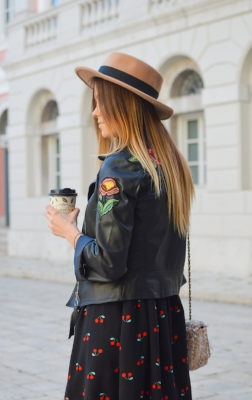
Many of us Jewish women have grown up with the term “tzniut” (or tznius, as it’s pronounced in many circles). And most of us know it mainly in reference to the dress codes we have to follow. Very few people have the opportunity to really learn about the overall concept. That makes things difficult. True tzniut can be empowering if we understand what it really means. More often than not, we don’t.
I’ve become a sort of myth-buster about tzniut, so here I am to bust the myths and give you what I’ve learned to be the truth. I write mostly about how to dress well and look good, so I’m going to focus on that.
The main myth about tzniut is that it’s all about a dress code. This myth is perpetuated by the above-mentioned fact that most women have little to no exposure to the concept, except when they encounter the dress codes. Either they attended yeshiva and had to dress according to those dress codes (or maybe even wear a uniform), or they didn’t and have only seen Orthodox women dress according to those dress codes. And it’s not unusual for them to see some very unattractive versions of it. Hence there’s another myth: the idea that tzniut means that you’re supposed to dress frumpy and unattractive.
Many Torah-Observant women have answered this by saying that it’s the difference between “attractive” vs. “attracting.” According to these women, tzniut means that you’re allowed to dress attractive but not attracting (that is, not provocative). That sounds fine, but to me, it’s incomplete. The dress code rules tell you how to not look attracting, but they don’t tell you how to look attractive.
This is why I’m here. I’m a stylist and I teach women how to look attractive without looking attracting. But first, we have to understand what true tzniut really is.
True tzniut is about who you really are, what you have to offer, and your relationship with yourself and with HaKadosh Baruch Hu. At a minimum, you’re a human being who was created in the image of G-d. That, all by itself, means that you have an inherent dignity and you deserve to feel good about that.
Then you have to think about the things you’re doing and what makes you happy. Do you love to draw or paint? Do you love to read about history? Do you enjoy tinkering with computers? Do you enjoy playing basketball (or some other sport)? Maybe your work is something you love. Judge Ruchie Freier has said that she was always passionate about the law. In fact, career coaches will likely help steer you towards a good career by figuring out what you love and focusing on that.
When it comes to our clothes, yes, we’re supposed to cover up and wear things that are not provocative, but we are NOT supposed to go so far as to hide. The opposite is true. We’re supposed to wear clothes that fit and flatter our unique body types and that make a statement about who we really are.
The first statement we want to make is, “I’m healthy and active”. That means wearing clothes that make you appear healthier. You could be anywhere from petite to average to tall, and anywhere from size 0 to size 14 to size 24. This may be more a little more difficult for certain women who have a hard time finding clothes that really fit and flatter, but it’s doable for every woman. And considering that there’s a very prevalent myth in the secular world that tzniut means dressing frumpy, it’s necessary to dispel that myth by sticking with clothes that flatter.
Then there’s the statement of your personal style. One myth about tzniut is that you’re supposed to blend in and not be in the spotlight. Maybe you’re the type who prefers to stay behind the scenes—and that’s fine—but true tzniut demands that you not hide completely. I remember one writer who wrote that she would prefer it if people recognized her for her personality and not by what she’s wearing. I agree with that, but it doesn’t come from nowhere. People aren’t going to recognize you by your personality until they get to know you. And they’re not going to get to know you, unless they first know that you exist. And they’re not going to know that you exist if there’s no sensory cue to set you apart from all the other faces. Many of my friends knew me first as “the lady in the mitpachot” or (before that) “the lady in the berets.” Now they know me better.
The truth is, that true tzniut demands that you maintain your dignity, but it also demands that you allow your unique self to be seen, and that you share what you have to offer with the world. When you practice this, you’ll find that you’re feeling better about yourself. If I can do it, so can you.